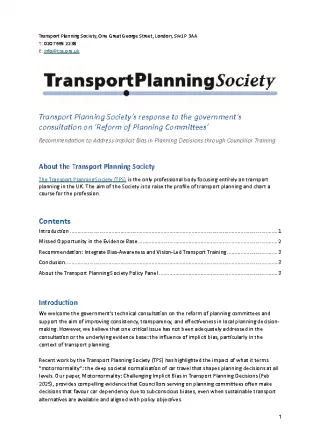-
Events
See all events here
-
Jobs
See all the current vacancies.
-
Membership
Open to all those studying or working in transport planning, or related fields, on a professional basis.

Implicit Bias in Planning Decisions - Recommendations
TPS Responds to Planning Committee Reform Consultation
The Transport Planning Society (TPS) welcomes the Government’s proposed reforms to planning committees but highlights a critical omission: the influence of implicit bias—particularly the unconscious preference for car-based transport known as motornormality.
Our response calls for mandatory councillor training to help planning committees make balanced, inclusive decisions aligned with national goals for sustainability, decarbonisation, and healthy placemaking.
Key recommendations:
- Address subconscious car-centric bias through training and case studies
- Emphasise vision-led, sustainable transport planning
- Support inclusive decision-making that reflects the needs of all users
- Enable planning committees to critically evaluate highways advice
- Share best practice nationally through peer learning
Read our full response below to understand how addressing bias in decision-making is essential to building a fairer, greener transport future.
The TPS Policy Panel was formed in November 2024 to
- Ensure TPS is influential and proactive in seeking improvements in policy and practice, and in setting the transport agenda at a national, regional and local level.
- Be proactive in the creation of an open, diverse and inclusive transport planning community.
- Provide the widest possible forum to engage on relevant and topical transport planning issues.
- Improve the public understanding and the image of transport planning and transport planners, and promoting transport planning as a profession.
The panel has five sub-groups, and this piece has been crafted by the Development and Landuse Planning Policy Group. On an individual level, it has been produced by Dr Colin Black (Mayer Brown Ltd), Nicola Waight (Hampshire County Council, Joely Hill (Transport for London).
Web design by Tribal Systems








